Early days
50 years ago I was in a quandary. I’d just graduated from high school and was in two minds about my future. I’d had a worse-than-useless interview with the careers advisory team at the college. Short of tradesman they’d suggested becoming a Gas Fitter which seemed at odds with my qualifications in Economics and Law. They’d obviously not seen my pathetic efforts at metalwork or home economics either. A career using my hands was not on my agenda.
Back then there were fewer universities, higher barriers to entry and a ‘career in the city’ wasn’t dependent on having a degree as a passport to entry. A gap year was something people from public schools did and I’d worked at weekends and during school holidays so understood what getting up to go to work felt like.
My father was a capable senior banker based in Bishopsgate dealing in international trade and, though we were of different temperaments, I was intrigued by his stories around “Bills of Lading” and “Letters of Credit“. So, I chose the City and an entry-level role (in Payments) at Lloyds & Bolsa International Bank in Queen Victoria Street.
A declaration at 50 not out!
England are currently taking on Australia (The Aussies) in a cricket series known as playing for the Ashes:
The Ashes urn, made of terracotta and about 10.5 cm (4″) tall, is reputed to contain the ashes of a burnt cricket bail.
Wikipedia
Already there has been a bit of controversy about an early declaration. As I think about my future declaration, I thought it an opportune time, some 50 years on since I started work, to look back at some of the experiences that have shaped my working life (and that of the great people I’ve worked alongside and for).
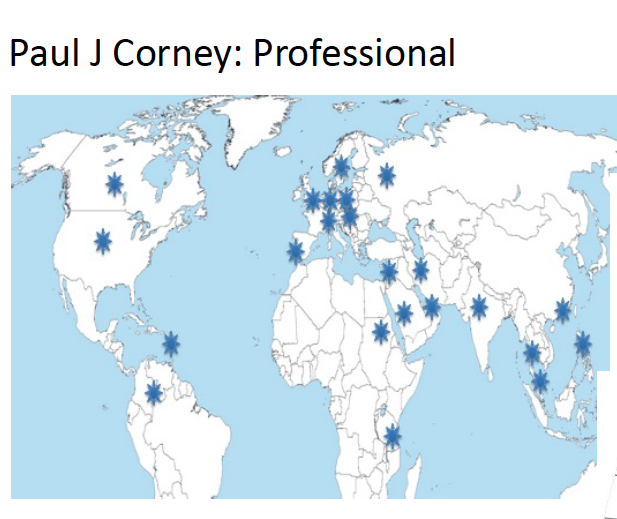
Over the coming months, I will be approaching some of the people I’ve worked with across 30+ countries as a professional and working on a pro bono basis inviting them to contribute to this valedictory by answering two questions:
- Can you think of an incident/event or project/piece of work we were both involved in that sticks in your mind; and
- If you were to, sum up in a word, phrase, anecdote, or piece of advice, you took away from working together, what would that be?
These reflections don’t have to be earth shattering, big or even international. They might be amusing as well as insightful. Here’s an anecdote from me:
Dress to impress
I remember one occasion in Riyadh when, as a fledgling young banker, I was about to have dinner at an Ambassador’s residence. My then boss, Ford Fraker (later to become the US Ambassador to Saudi Arabia), who was accompanying me to the dinner, suggested as a mark of respect that I buttoned up my jacket before being presented to the Ambassador.
It was my first experience of a formal dinner and the way Ford shared the experience stayed with me. He explained the importance of personal presentation in getting attention. And some decades later, while giving a keynote in Colombia, I deliberately changed my appearance and dressed down (in slacks and a jumper) to stand out from the suited crowd!
Very often it’s the little things, the rituals, the noticings that are important. Hopefully, this will surface a number of practical learnings that others might adopt or avoid! I’m looking to share half a dozen stories and observations before the year is over.
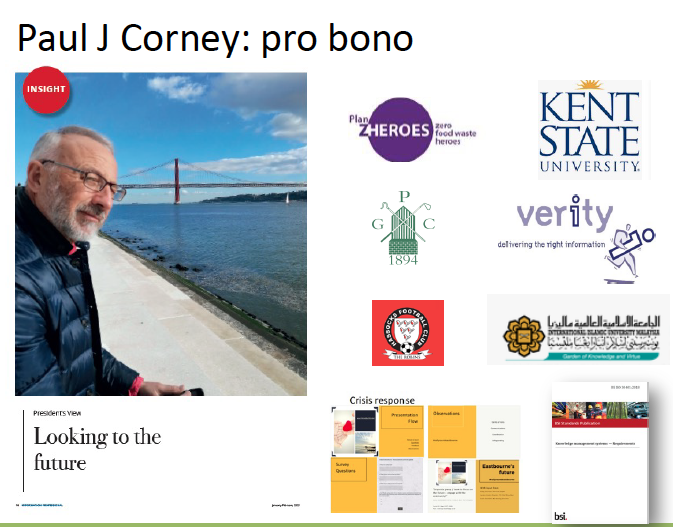
If having read this you feel moved to contribute I would be delighted to include your thoughts. Comment below or email me: paul.corney@knowledgeetal.com
Stop Press (July 1st)
Here’s a few of those who’ve already contributed – check out their comments below
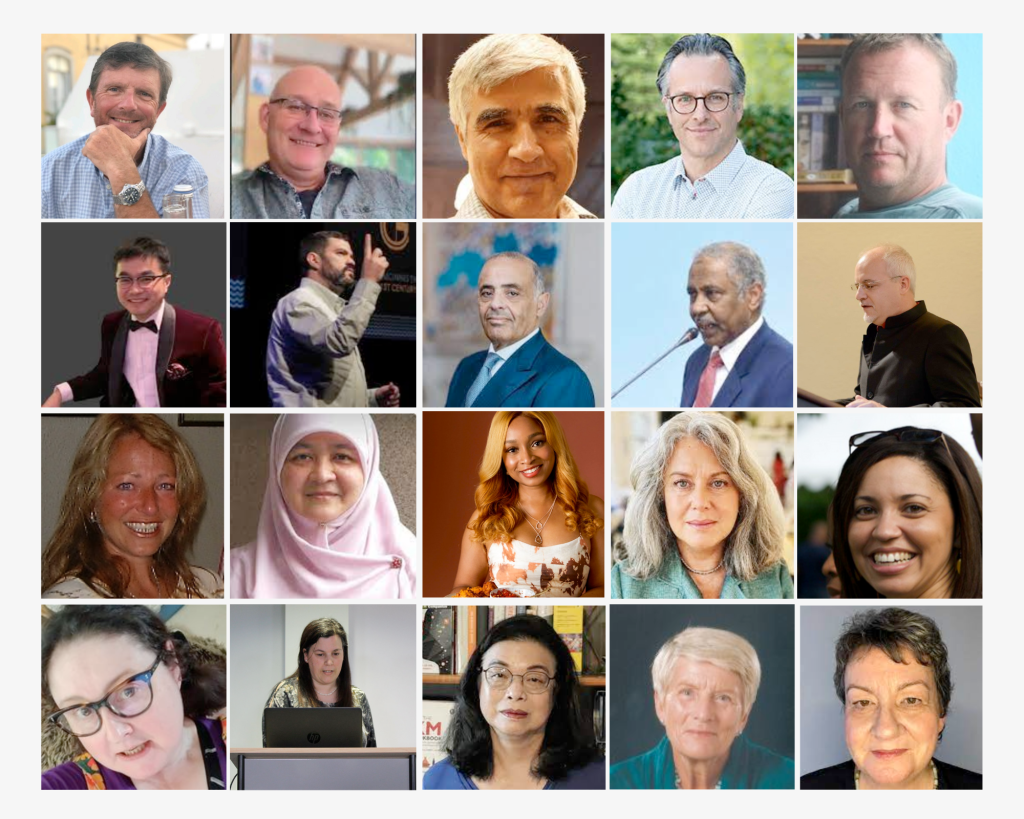
Stop Press II (August 1st)
The willingness of former clients and colleagues to participate has been humbling. Here’s another batch.
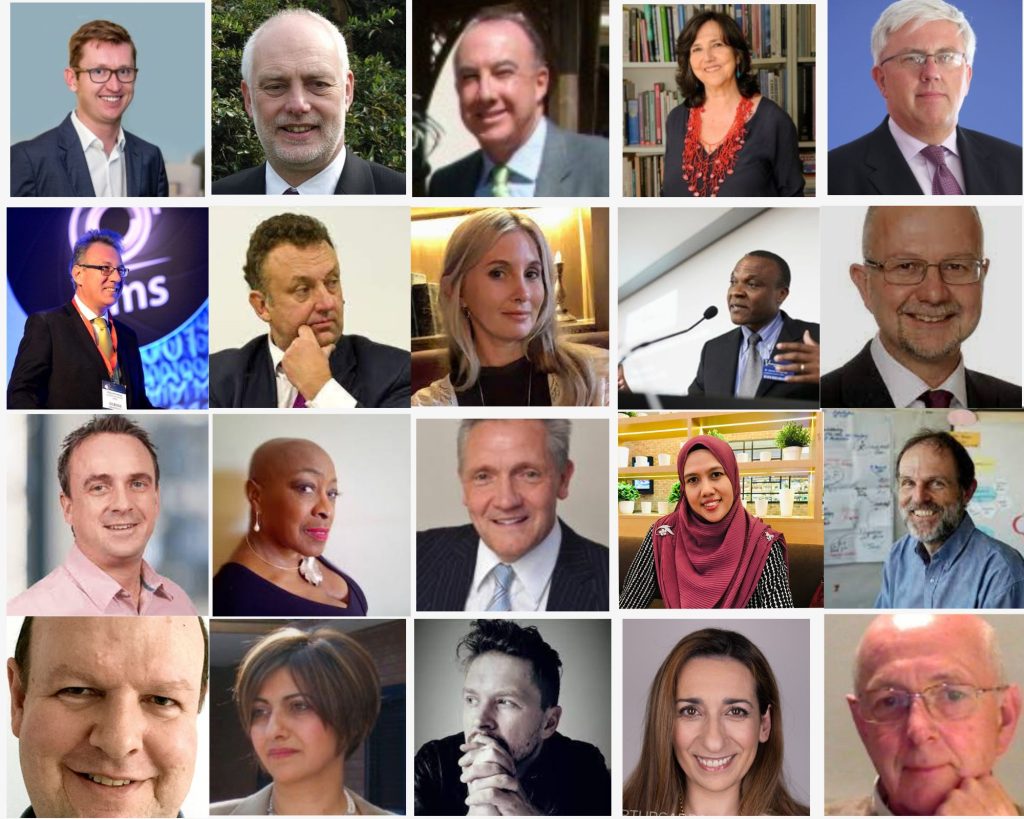
Stop press III (September 3rd)
Well I never expected to get input from some many wonderful people and I’m delighted to report I’ve crossed the 50 mark concurrent with the 50th Anniversary of the day I started work (3rd September 1973). It’s been a truly humbling experience and as James Macfarlane says
Paul is simply “clearing the decks” in preparation for the enduring journey together to continue. I asked Paul if I could be his 50th Footnote in his journey. To prepare us all for the adventures to come.
What that journey looks like is open to suggestion. Many of the contributors have acknowledged the rich learning content that has been generated. Over the next few weeks I will be reaching out to a number of people to get their thoughts on how I might pass on my observations, tips and insights. Watch this space!
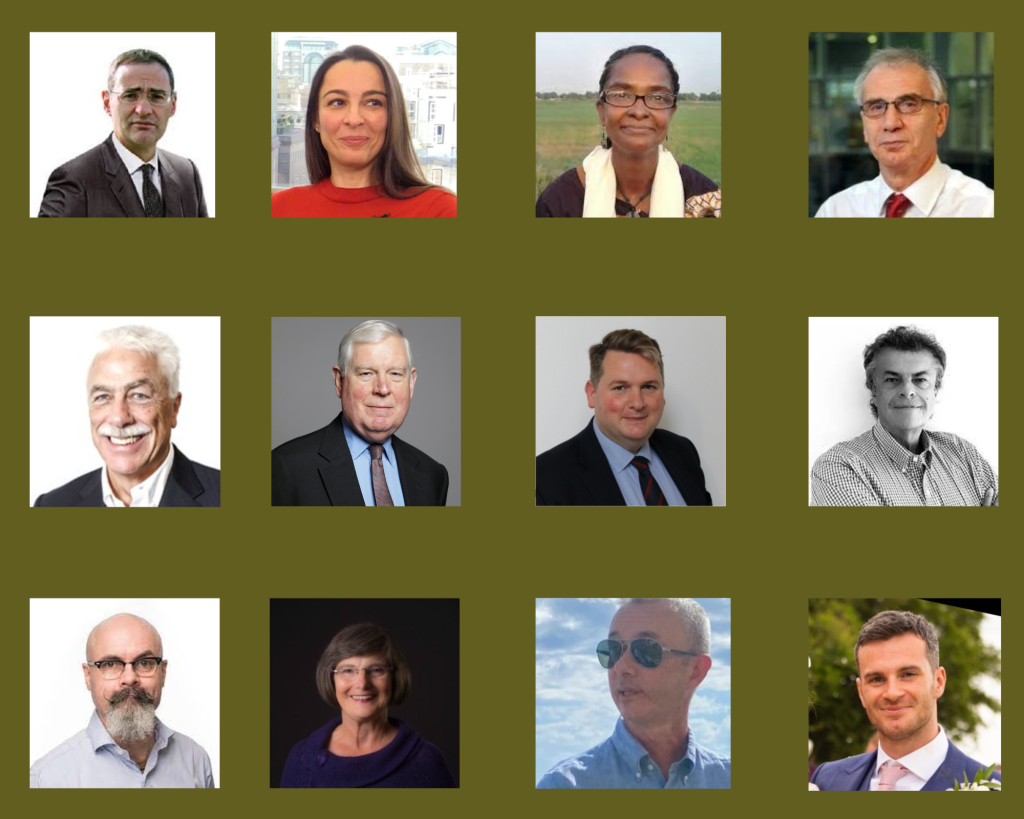
Stop Press IV (March 5th)
While in Lisboa in September last year Edwin Morris of Pioneer Knowledge Services approached me to see if I would talk “on the record” about the Collaborative Valedictory process. Today that interview is published and can be found here:
And finally: Stop Press V (April 5th)
Today I had the pleasure of talking about the Collaborative Valedictory on BBC Radio Sx’ Sarah Gorrell show, as part of a feature on working on beyond retirement. Watch this space……
Listen here:


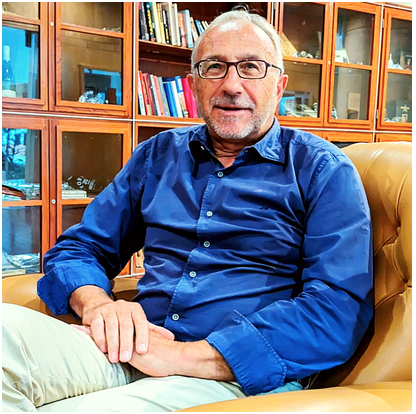
Paul and I first met when we both worked at Saudi International Bank. In the early 1980s, SIB was asked to develop a workable system of Sharia compliant banking at a time when this type of financing was in its infancy and bedevilled with a lot of dubious products which, in the words of one Scholar, were “designed to deceive the faithful”.
The challenges were enormous, encompassing both the banking and commodity markets. Paul’s technical skills enabled us to develop products which met both the needs of the banking regulators and of the Sharia, many of which are still used by Sharia compliant institutions to this day.
We could not have achieved any of this without Paul’s charm, sensitivity and understanding of Islam, enabling him to focus on what the Sharia requires and the technical solutions that had to be developed to create a new market from scratch.
Besides which, he was always fun to work with, having a delightful mix of humour and cynicism which kept us all sane.
Shame about the traffic
Dear Matt, or to be more accurate, The Right Honourable, The Lord Carrington of Fulham, I’m delighted you remembered the amazing work you, Duncan, Richard & I did setting up SIB’s sharia compliant trrade finance and leasing activities some 35 years ago.
While many were sceptical of the veracity of the products it is heart warming to see many of them still in use today.
If I may I’d like to share a story “Shame about the traffic in London” from the time when you were the Member of Parliament for Fulham.
There is a wonderful Arabic saying which captures the essence of this and broadly translates thus:
He who doesn’t know, says “lentils.” Explanation: Those who don’t know the true story will just say anything as an explanation.
Matt, you’ve had a distinguished career and I appreciate you took the time out to remember the time we spent working together.
My Takeaway: It’s important to plan but when it goes awry you have to think on your feet and take control of the situation irrespective of the potential personal fallout!
Paul has been instrumental in supporting me in my journey to being a very confident and successful Knowledge Manager. He helped to introduce me to many of my peers, his network is second to none with the creation of ARK being a real highlight.
Throughout he has brought leadership to our industry and is always on the lookout for opportunities to help others grow. A particular highlight for me personally was being invited to record a video interview with him to help publicise his new book, my talk at a future ARK conference and of course the wider conference itself. While previously being reticent to do these types of things the video was subsequently viewed x times.
https://youtu.be/4w8SNmtnrck
The whole experience gave me such a boost that I have subsequently gone on to record many industry podcasts as well as talking at the Henley Business School.
As it should by now be obvious, without Paul’s mentoring, guidance and presence many of the above may not have been possible.
Monica, it’s been a great pleasure to have walked some of the way with you on your KM journey.
We first met as you might recall at The Potting Shed where as Co Chair with David Gurteen, of KM UK 2014, I’d organised a speakers dinner. Incidentially it was the same dinner where I met Patricia Eng with whom I would go on to write a couple of books. It proved to be a very convivial evening with many friendships made as a result and a feeling of collegiality among the cadre of speakers.
If I may I’d like to take you back to ‘that interview’. Nick Stone (then of Ark) asked me to comment on you and I described you as a survivor.
I noted that you recognised the importance of managing networks and communication and building communities.
We then went onto talking about the “Give/Get” principle and what I describe as the role of a Knowledge Matchmaker. This was when I was describing KM’ers as “Knowledgeurs”and running masterclasses on the 8 ‘ates.
Going back to that first meeting, it’s rare that I disagree with David Gurteen but on the topic of the speakers dinner we did. David being of an egalitarian pursuasion felt everyone should be invited. My stance was that to produce a coherent event that flows well it’s useful to have lowered barriers that inhibit by breaking bread and drinking wine with those who are ‘performing’.
I continue to argue the importance of neutral space for knowledge exchange and collaboration.
If there is ever a ‘real-life’ voice of reason/guardian angel type then Paul has been it! 10 years ago I had just begun my first business, a family business in the mad world of catering. During that time my journey, along with the journey of my business partners, was eventful to say the very least!
Paul was there throughout; he was our first follower on Twitter, he was having coffee in week one and by week two he was helping us make steps to build our business. Paul has helped us understand key business principles, given us advice, consultation and helped me grow as a business person from the young, inexperienced 22-year-old I was.
Whether it was advice on people management, conducting shareholder meetings or developing key operations/systems within the business, Paul’s help was always right on point.
Whilst Paul has a clearly high understanding of business – in which I value his help very highly – one cannot put a value on the support and mentoring he gave us all on a personal level.
A huge thank you for the support and advice through the good and bad times.
Joe, those were the days. Le Magasin was but three shops away from the first “Bills” restaurant and yet you and Frankie developed a business that became one of the ‘go-to’ venues in Lewes.
Running a family business is often very challenging especially if you “live above the shop” as many Hybrid Workers do today. And when your prospective in-laws are the major shareholders the propensity for fallout is multiplied.
You noted those early meetings / discussions and I recall asking, “Who is your target client?”
It was a question you weren’t prepared for so we quickly set about creating a personae of the ideal client: a professional woman aged 30-45 who would be tempted to stop by after work with a friend for half a carafe of wine and a sharing platter, and all for £25!
I looked back at the minutes of the first shareholder meeting I presided over and was struck by the issues we had to resolve quickly if the business was to achieve the Profit Margins everyone wanted.
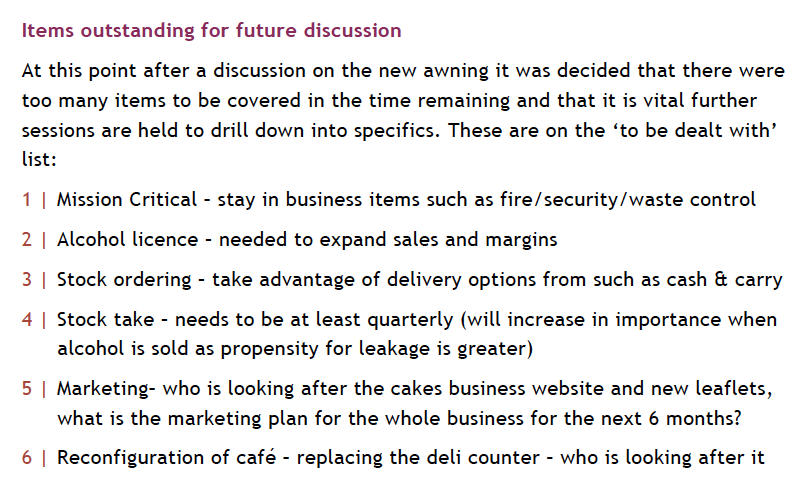
That these were quickly dealt with were to all of your credit.
My Takeaway: In whatever business you are in you need to create a cadre of followers who feel a sense of ownership of your product or service. This requires the same effort that a Knowledge Manager has to apply when managing stakeholder interests.
I first met Paul over 10 years ago when I was Government Head of Profession for Knowledge and Information Management. I have always been impressed with Paul’s professionalism and his commitment and passion for knowledge management.
Paul was instrumental in inviting CILIP to be represented on the BSI’s Knowledge Management Group which was developing BSI/ISO 30401Knowledge Management Systems Standard. I then spent 7 enjoyable years working with Paul on the group and together we wrote an article for CILIP’s Information Professional journal on the standard https://www.cilip.org.uk/news/435197/The-new-ISO-Standard-for-KM-is-coming.htm.
Paul has always been a great supporter and advocate of advancing knowledge management as a profession and so met with me as Chair of CILIP’s Board and Nick Poole CILIP’s CEO to discuss CILIP’s role in KM and the rest is history!. Paul joined me on CILIP’s KM project board which launched CILIP’s KM chartership.
Paul later became CILIP’S President in 2020.
We in KM owe so much to Paul’s perseverance and dedication.
“It was you. You ruined my holiday!”
Dear Karen, well remembered and thank you!
We met over a coffee as you will undoubtedly recall at a NetIkx event you were speaking at in London in your role as Head of Profession K&IM for HMG and Chief Knowledge Officer of a large and secretive government organisation in Cheltenham.
You opened as above and since being rude is not one of your traits I was taken aback until I discovered why my name had come up in a conversation with the Cabinet Office while you were on vacation.
Back in 2013 the UK Government’s Knowledge Management “Profession” under your leadership had produced a draft of a new 5 year Knowledge & Information Management Strategy with the strapline: better informed, better government.
As Head of Profession you had introduced the document by writing:
And this visualisation set out the UK Government’s vision.
At the time I was leading a Knowledge Capture & Retention programme for a Government Ministry and had access to the draft. I was impressed. So I put up a post to that effect which was liked by many in central goverment.
The draft was never turned into an approved document – a missed opportunity given the good work that had gone into it’s production.
Feathers were definitely ruffled and I received a call imploring me to take down my post. I declined but did agree to make certain changes to save embarrassment.
Unbeknown to me “powers that be” had contacted you to ask who I was and why wouldn’t I take down the post. At that point we hadn’t met though I was the cause of a day’s holiday ruined.
That we’ve gone on to share so many experiences and acheived so much in tandem is a source of great pride. And Patricia and I will always be grateful to you for your review of our first book.
My takeaway: It is important to stand your ground if you believe in something and to call out good practice when you see it irrespective of the political pressure.
I first met Paul as a fellow speaker at a Knowledge Management conference, probably in the early years of the century, when I was advocating for social technologies and knowledge networks. I was impressed with Paul’s openness to these ideas as somebody with a grounding in more traditional knowledge management techniques and thinking, but also with his curiosity and absence of ego in contrast to other speakers at this and similar events. We stayed in touch and crossed paths a few times, and these initial impressions were reinforced in those subsequent interactions.
I had the pleasure to work with Paul directly a couple of times in the intervening years, first as an invited speaker for an event he organised for a client, and then when his organisation Sparknow kindly commissioned my team to produce an online toolkit for DEFRA.
But the encounter that lingers in my memory was more recent, and transitioned us from professional colleagues to friends. I had recently moved to Lisbon with my family, and I was attending Ana Neves’ lovely Social Now event for the second time, this time with my daughter, who was probably 17 or 18 years ofd at the time. Paul instantly and effortlessly made her feel comfortable and included, and was curious, kind and interested in her experience of being suddenly relocated to another country, and generous with his superior knowledge of the place. It made a really strong impression on me, and in a funny way made me question my own prejudices and ways of seeing people – why did it surprise me?
Since then, we have enjoyed many a good chat over dinner, and I continue to enjoy Paul’s worldliness, curiosity and openness to new thinking and ideas, whether to do with knowledge in organisations, human behaviour or world events and learning from his experience.
Hey Lee, that’s very generous, thank you for noting the episode at SocialNow. I’ve always believed that if you ‘put it out there’ and give it will be repaid in a similar kindness at some point.
I too recall those early meetings and inviting you to BMS where I was an Advisor during the noughties. I was a great admirer of the clarity with which you got your ideas across as it proved on the day when you gave a compelling presentation on the power of social networks which helped transition the management team from sceptics to believers.
It was interesting too, to look at the “Scores on the doors” from the KMUK2010 conference I chaired and which you spoke at. Almost every comment on your presentation used “Thought Provoking“!
That we’ve become friends and you’ve assimilated into Portuguese culture is a source of great satisfaction and I admire the ease with which you’ve slipped into running a global business from Cascais. A great example of practising what you preach.
The Defra assignment of 2008/9 was particularly interesting:
Phase III was to create an online toolkit (a wiki) to enable all levels of skill to undertake a horizon scanning & futures project.
It was built on a lessons-learned exercise about which one of the Defra team said:
My Takeaway: If you are experiencing pushback on a project or change programme It’s often worth the risk of bringing in an outsider to give the senior management team a different perspective and a new voice.
Like Paul, I’ve also passed the 50 years of ‘working’ mark … having sailed through my A-levels at 16 years old, my parents thought I was too young to go to university, so my mum managed to convince IBM to take me on as a student. I worked there for the next 5 years as a programmer/analyst, 3 of them part-time during my vacations from Bristol Uni, where I somehow managed to achieve a 1st class honours degree in Maths, despite having a huge amount of fun and working for IBM for 5 months per year.
I learned early on in my career that it’s good to gravitate towards doing things that you’re good at, things you enjoy doing … so it wasn’t long before I found myself performing commercial and management activities. Which I carried on fulfilling for the next 20 years for 3 different companies, in several countries around the world … before I realized it was time to focus again on one of my life’s mottos: “do what you enjoy (for as much as possible), and enjoy what you do (no matter what it is you’re doing)”.
It was clear to me that I was no longer fully enjoying what I was doing in my business life, so I decided to quit ‘corporate’ life and strike out on my own, to build a training and coaching business.
After 23 years of doing this, I can honestly say that most of the time it hasn’t felt like ‘work’, and still doesn’t at 69 years of age … primarily because I hugely enjoy what I do + I feel that I’m adding a significant contribution to many people + I continue to learn and grow.
Now coming to the period when I spent time working together with Paul: it was towards the back end of my ‘corporate’ life, I was the MD of a software & services company and we contracted Paul to be the Integration Manager to help us merge two businesses, our own and one we had recently acquired.
It was clear from early on in my interactions with him, that not only was he very capable at executing the role, but he also seemed to enjoy almost everything he did … a life motto that we clearly shared, albeit he was enjoying much more at the time than I was!!
Nothing was too much trouble for Paul, he had a very high level of service orientation … and always kept his commitments, to the best of his ability … two more things we had in common.
However, there is one of Paul’s qualities that stands out for me, because it was something I clearly didn’t possess: his superb ability to listen to both/all sides of a discussion, and to expertly mediate a path to a successful compromise that all parties could accept … a master diplomat.
Having seen him in action many times in this role, it stuck in my mind as a quality I would like to develop … it took me quite a few years of practice, and I can’t profess to be at his level, but I’ve certainly made progress.
Thanks for this and many other things we enjoyed together, Paul.
Dear Richard, thank you so much. The time I spent as Business & Strategy Advisor during the dotcom era with AppliedNet / Polydoc > Sopheon was a career highlight. Conngratulations on your milestone and the amazing career.
Creating a corporate identitiy, with disparate nationalities and cultures, Dutch and English then American and then German, so that everyone felt heard and empowered was a challenge.
Three aspects of the integration programme stand out:
– Integration events we ran in Scheveningan and Pennyhill Park
– Quarterly global staff conference calls where each region presented their own ‘virtual cake’
– Developing a Sopheon culture where staff from each region shared their aspirations and expectations which we then compared to that of the management and board!
That, some 20 years on the organisation is thriving bears testimony to the work we all did.
Here’s an anecdote that shows the importance of diplomacy in the early stages of integration.
This was a theme that continued in the quartely global staff calls. As a way of learning more about the culture of each region I invited the host (the meeting moved around offices) to share their local cake and to ensure the other offices had a plentiful supply.
It is said that the majority of mergers fail to realise the synergies envisaged. Part of that is inevitably due to a reluctance to establish then embrace a new combined culture that reflects the strengths of each business and national characteristics. At the offsite integration events we devoted much thought into the composition of the various teams that were tackling each of the tasks. Laughter was a key component as was a shared sense of achievement.
My takeaway: people gravitate towards order and structure, charismatic leadership and a meritocracy – where good performance is rewarded and poor performance tackled. So much is about great communication and a sense of shared values. There is no substitute for getting that right at the beginining and being very clear about how the organisation is going to work.
Here’s a snapshot of the corporate and meeting structure we adopted
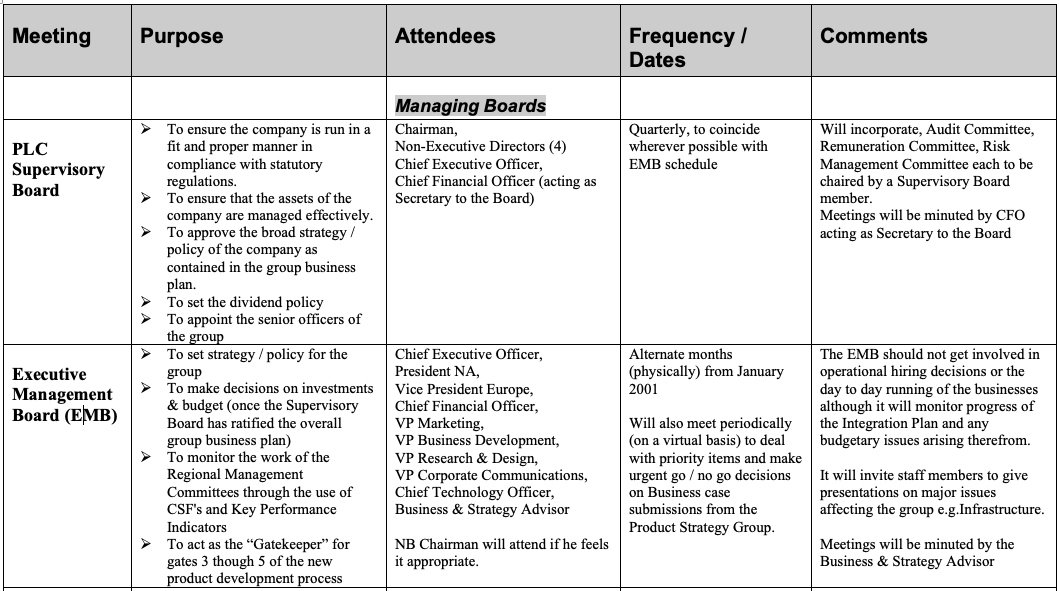
Reflections on a Well Spent Journey!
Paul and I have journeyed together for almost 30 years.
Which leads me to the consideration and question “What makes a journey together enduring?”
In business, as in life some of the enduring considerations to journey together are common aims, goal, values, mutual respect, fun and above all Friendship. For me, these are just some of the key ingredients which lead to a lasting and enduring relationship.
In the early years our aims were often aligned. In Paul I recognised at a very early point that he possesses an abundance of the emotion empathy. Paul is in an instant capable of understanding of the others in the room. Empathy is a powerful and undervalued business emotion which is not something we commonly see in our business leaders and communicators.
In working with Paul, we could relate and reinforce our common goals and work collectively to achieve those goals even when many considered “we were at times flying by the seat of our pants”!
We have always tried to question and find the values behind the business values which have driven us. Without a proper examination of values business and the success those business values can deliver, success can often be a very shallow and hollow experience.
The quality of mutual respect needs to be earnt. Together we have spent a considerable amount of time understanding each others strength and frailties. In my view, bolstering those is a key sign of gaining and retaining respect for each other’s capabilities, achievements and accolades.
One can’t journey for so long together without their being fun in the time spent together. The ability to laugh unashamedly at yourself and laugh with others is a key to ensuring the freshness and anticipation of the current and next adventure together.
In my view, none of the above can be symbiotically possible without a lasting friendship.
After 50 years, most of us can reflect on our business friends and as a wise man once told me if you can count the true business friendships you have on the fingers of one hand you have indeed been fortunate. I count Paul as my friend.
When Paul asked me to write an entry in his Collaborative Valedictory celebrating 50 years in business, I was momentarily concerned he might be preparing me for the worst news!
However, I now see Paul is simply “clearing the decks” in preparation for the enduring journey together to continue.
I asked Paul if I could be his 50th Footnote in his journey. To prepare us all for the adventures to come.
Thank you, Paul, for the journey, so far!
Your friend – James
Paul, we met in the early noughties when Victoria Ward introduced us at Sparknow. At the time, I was starting out as a designer and facilitator. What I remember most strongly was the warmth and kindness you showed in our interactions, and the generosity with which you shared your knowledge & wisdom… Does WM (wisdom management) exist as a term? It should, because you did it. Many thanks for our great chats over the years! All the best, Chris
Chris, as always your contribution is pithy and insighful. Thank you.
The importance of creating a welcoming environment is key to getting the most out of the people who work with you.
I was drawn to the account you wrote back to the Team while you were in Washington representing Sparknow at The Golden Fleece:
In a separate article recently I wrote about the importance of ‘Affirmation’. The account you over a decade ago plays to a similar theme about the role of the listener in helping to shape meaningful narrative.
Perhaps the biggest takeaway from the time we worked together would be the importance of changing perspectives particularly when trying to overcome intransigence or breakdown in trust. The work at Royal Mail a couple of decades ago is a good illustration. Here’s one of the exercises you ran:
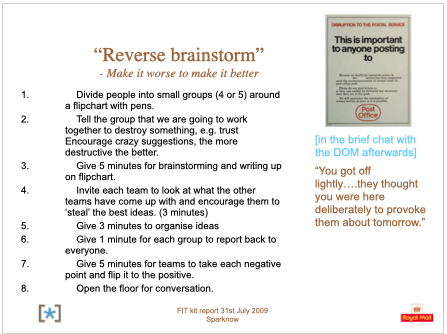
I cannot remember exactly when and where Paul and I met. Perhaps I get to know him through his work online before we even met. I do remember whenever we met – whether it was a business professional context or in a more social setting. He always have great and inspiring stories to tell. These stories will bring us to different continents and different cultures. He always recommends me to new books, speakers and always reminded me that our KM work is ultimately about value it brings to the business. Thank you Paul for your inspiration and fun and work we shared together!
Dear Bonnie, we have worked together on a number of occasions: Euroclear and Astra Zeneca immediately come to mind. I’m glad you chose to highlight the need for KM to add value to the business. During our most recent discussion in Lisbon you talked about how much the “8 ‘ates” have influenced your thinking: the need to focus on the soft skils of managing change which certainly came to the fore in the amazing transformation work you’ve done for AZ which i know contributed to the rapid development of a covid vaccine.
We first met when I presented at KMUK a few times over the teens. Of course I learned more than I imagined every time I heard you speak. You effortlessly find the learning in every conversation, and you can have a lot of conversations over a 50 year career (and counting).
Reading through this valedictory last week as research for my first consulting role after a few decades as an employed KMer in the NHS, it felt like whatever the opposite is of pulling teeth – your experience and your generosity with it, leaps off the screen effortlessly in bite-size, digestible pearls. Thank you
This all fed into a really constructive conversation we had as I try to get my teeth into this consulting thing. You invited me to ask three questions. I thought I’d want to ask a hundred, but inspired by the way you condensed conversations, experiences, even lengthy relationships into actionable pearls of learning, I condensed my messy thoughts down to 3 key questions.
Thank you so much for the advice, stories and inspiration over the years. You’re a star
I first met Paul through my work with CILIP and as I was starting to delve into the wider professional world of Knowledge and Information Management. it seemed wherever I turned Paul’s name appeared (in a very good way!) and as I started following Paul’s work I could see why – he was a source of great insight and knowledge but also of innovation and pushing boundaries in an ever evolving profession and opened my eyes to many possibilities out there which gives me much needed inspirational boosts!
One thing I really appreciate though alongside such a great body of work is the real and genuine understanding of people and being able to form great human connections where you can have meaningful but also funny conversations that will really make you think!
I consider myself very lucky to know you Paul even in my small way so long may it continue and thank you for being a great inspiration on my own professional journey so far.